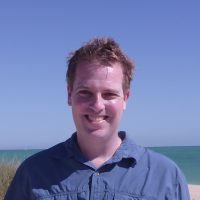Ryan Lowe
Professor, Chief Investigator and Program 3 Leader
Ph.D. Stanford University • M.S. Stanford University • B.S. University of California
University of Western Australia

From 2005 to 2022, the main node of the ARC Centre of Excellence for Coral Reef Studies was headquartered at James Cook University in Townsville, Queensland (Australia)








Professor, Chief Investigator and Program 3 Leader
Ph.D. Stanford University • M.S. Stanford University • B.S. University of California
University of Western Australia
My research involves the study of how oceanic and atmospheric forcing drives the circulation and distribution of wave energy within a broad range of coastal systems (e.g., on beaches, coral reefs, rocky shorelines, and in estuaries). In most cases, this work is motivated by the need to improve our understanding of the coupling between hydrodynamics and other key processes occurring in marine environments, such as sediment transport, biogeochemical cycling and spatial ecology. As part of this work, I employ a wide range of field, laboratory and numerical modelling techniques. Major research interests include:
Coastal and estuarine hydrodynamics
Numerical modelling of waves and coastal circulation
Coastal sediment transport
Remote sensing of coastal systems
Benthic boundary layer and canopy flow dynamics
Biophysical interactions in marine systems
New DNA techniques are being used to understand how coral reacted to the end of the last ice age in order to better predict how they will cope with current changes to the climate. James Cook Univer
A new study on the effects of climate change in five tropical countries has found fisheries are in more trouble than agriculture, and poor people are in the most danger. Distinguished Profess
James Cook University researchers have found brightly coloured fish are becoming increasingly rare as coral declines, with the phenomenon likely to get worse in the future. Christopher Hemingson, a
Researchers working with stakeholders in the Great Barrier Reef region have come up with ideas on how groups responsible for looking after the reef can operate more effectively when the next bleaching
Abstract: As marine species adapt to climate change, their heat tolerance will likely be under strong selection. Individual variation in heat tolerance and its heritability underpin the potential fo
Abstract: The Reef Ecology Lab in KAUST’s Red Sea Research Center explores many aspects of movement ecology of marine organisms, ranging from adult migrations to intergenerational larval dispersal
Abstract: Macroalgal meadows are a prominent, yet often maligned component of the tropical seascape. Our work at Ningaloo reef in WA demonstrate that canopy forming macroalgae provide habitat for ad
Abstract: Sharks are generally perceived as strong and fearsome animals. With fossils dating back at least 420 million years, sharks are not only majestic top predators but they also outlived dinosa
Abstract: Connectivity plays a vital role in many ecosystems through its effects on fundamental ecological and evolutionary processes. Its consequences for populations and metapopulations have been
Abstract: Evolution of many eukaryotic organisms is affected by interactions with microbes. Microbial symbioses can ultimately reflect host’s diet, habitat range, and even body shape. However, how
Abstract: The past few years have seen unprecedented coral bleaching and mortality on the Great Barrier Reef (GBR) but the consequences of this on biodiversity are not yet known. This talk will expl